← Back
Shark week: Dr. Gregory Skomal talks tagging and what the future constellation will bring
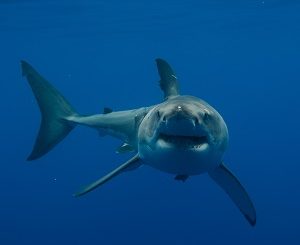
“I think anyone who’s used Argos will have to admit that they’ve learned something revelatory. The more we use Argos to track animal movements, the more we see that their movements are far more complex and of greater scale than we ever imagined.”
Featured photo credit: Greg Skomal
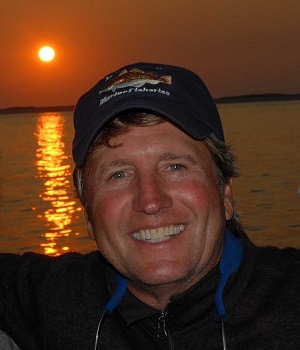
Photo credit: Kimberly Skomal
Dr. Gregory Skomal, an accomplished marine biologist, is currently heading up the Massachusetts Shark Research Program (MSRP) and has been working at the Massachusetts Division of Marine Fisheries since 1987.
Through the MSRP, he’s actively involved in the study of life history, ecology and physiology of sharks and has been using Argos satellite telemetry since the 1990’s. In addition to the numerous scientific articles he’s written, he’s also appeared in a number of film and television documentaries including programs for National Geographic and Discovery Channel.
As a long-term user of Argos, we welcomed the opportunity to talk to him about his use of Argos, how his work will benefit from the upcoming Kinéis constellation and what advice he might have on tagging sharks.
Thank You Dr. Skomal for taking the time to talk to us today. To start, why did you choose Argos?
When it comes to animal movements, I don’t think there’s anything else that provides that kind of support. Let’s face it, Argos is synonymous with animal movements and vice versa.
More on Argos Wildlife Monitoring
Have you made any exciting discoveries through your work with Argos?
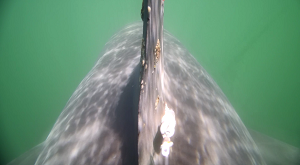
Photo credit: Greg Skomal
Most definitely! I think anyone who’s used Argos will have to admit that they’ve learned something revelatory.
Personally, one of the most amazing things we’ve learned using Argos was that basking sharks that we were tagging off the coast of New England were moving into tropical areas of the Atlantic and even going as far south as crossing the equator into the southern hemisphere.
So, we were having our tags report back not only from off the coast of Cuba, or The Bahamas or in the Caribbean Sea, but also as far south as Brazil. We never believed that a temperate shark would have this tropical aspect to its natural history, thereby re-defining what textbooks were telling us, but also that these sharks would make such broadscale trans equatorial movements.
We tend to think of Argos giving us geolocations, but Argos is also the vector for retrieving archived datasets, like animal depth, which allows us to examine three dimensional movements and discover some amazing eye-opening results.
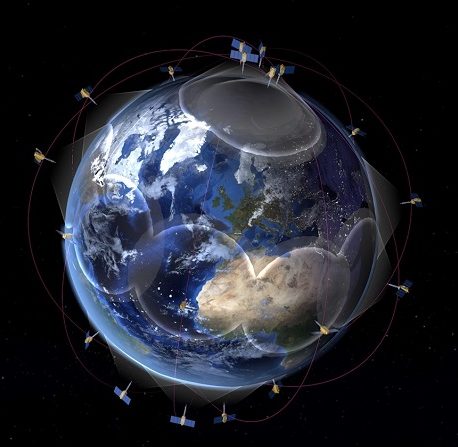 In 2023, 25 nanosatellites will be launched with Argos payloads onboard bringing new capabilities. How will your work, in terms of pop-up tags, benefit from this new constellation?
In 2023, 25 nanosatellites will be launched with Argos payloads onboard bringing new capabilities. How will your work, in terms of pop-up tags, benefit from this new constellation?
Anytime you can increase satellite coverage in time and space, you enhance our ability to retrieve data from tags. This is particularly true for real-time transmitting tags.
Some of our more sophisticated tags are only deployed for a few days, then come off the animal and need to be retrieved, so better satellite coverage will certainly assist with that.
Discover the Kinéis constellation
Finally, do you have any tips or advice to share on tagging sharks?
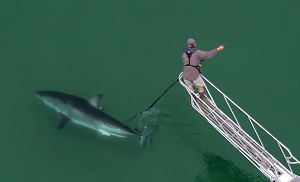
Photo credit: Wayne Davis
It depends on the species and location.
We find that the best approach, where possible, is to tag free-swimming animals from the side or pulpit of a boat because you minimize stress. You tend to get more natural behavior quicker than you would if you’ve stressed an animal by capturing and handling it – typically, when you capture an animal, you have to throw out at least a day or two of data after the release.
We worked with the Woods Hole Oceanographic Institution to develop a single pin attachment device that has enabled us to attach near real-time location tags to a white shark’s dorsal fin while it’s free-swimming, but this is still in the development phase.
